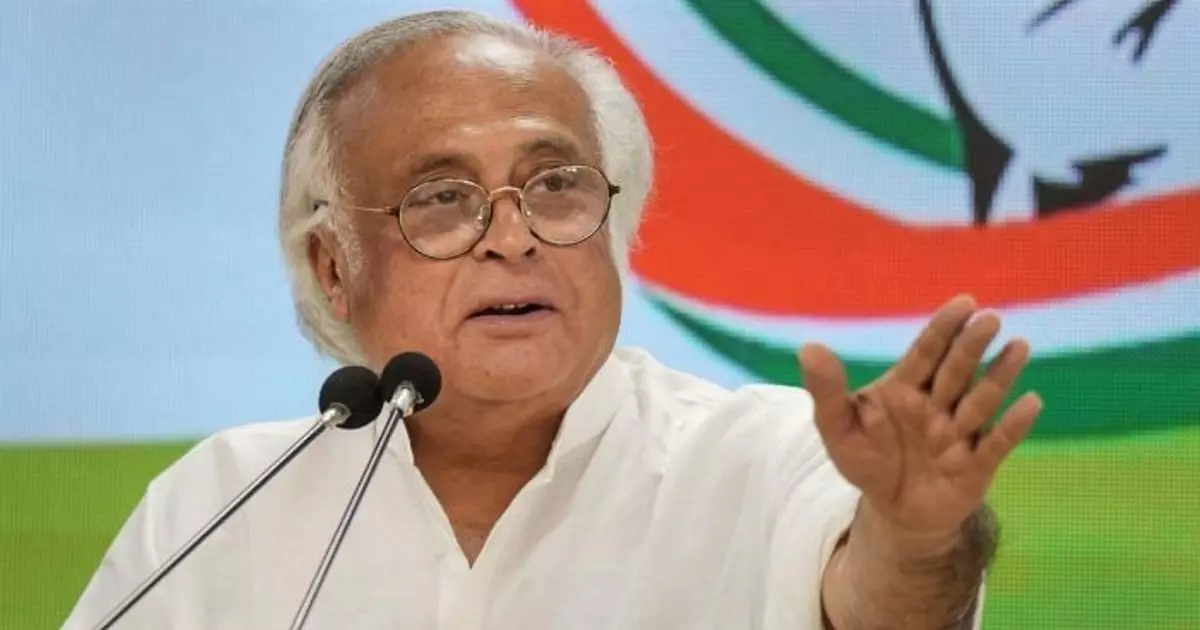Congress calls eco survey 'cherry-picked' view, says India in its most precarious economic situation
Jairam Ramesh claimed that the Economic Survey virtually admits the failure of the Centre's policymaking with regard to generating private investment
By Newsmeter Network
Representational Image.
New Delhi: The Congress alleged on Monday that the Economic Survey released by the government presented a "cherry-picked" view of the economy and claimed that India is experiencing its "most precarious and difficult" economic situation in many years.
Finance Minister Nirmala Sitharaman presented the Economic Survey 2023-24, along with the statistical appendix, in the Lok Sabha on Monday. The Economic Survey is an annual document presented by the government ahead of the Union Budget to review the state of the economy.
Congress general secretary in-charge communications Jairam Ramesh said the need of the hour is a right to apprenticeship, protections for gig workers and unorganised sector workers, minimum wage hikes to Rs 400 per day, an end to "tax terrorism" and an expansion of social-protection schemes like the one for anganwadis.
"The Economic Survey of 2023-24, released in advance of tomorrow's Budget, must have been a difficult document for the non-biological PM's spin doctors to produce. It does its best to present an 'all is well' rosy picture of the economy. Unfortunately for the PM and for the people of India, the economic situation is so desperate that some harsh facts come through anyway," Ramesh said in a statement.
Food inflation remains unchecked, at nearly 10 per cent per year, with prices of specific foods growing at a rapid pace -- cereals at 11 per cent, vegetables at 15 per cent, spices at 19 per cent and milk at 7 per cent -- he said.
Ramesh said the poor and the middle class are the worst affected due to this situation.
He said the economic recovery after COVID-19 has been deeply unequal, with rural India left behind.
"The Modi government's anti-farmer mindset is called out in the Economic Survey. Its abuse of import-export policy with unplanned and unjustified export bans and floods of cheap imports has been flagged for debilitating farmer incomes. Wheat, paddy, pulses, onion, sugar and edible oils -- no farmer has been spared by the whimsy of the government's policy-making," the Congress leader said.
The failure of the trade policy has also contributed to the decimation of India's manufacturing capabilities, he claimed.
Since 2014, imports from China have risen from 11 per cent of the overall imports to 16 per cent, the former Union minister said, adding that the uncontrolled dumping of these imports has rendered domestic MSMEs uncompetitive, forcing them to shut down.
"Housing, a critical sector, has also done poorly. In 2023, residential real estate sales in India are only now reaching back to the levels witnessed in 2013," he said.
Ramesh claimed that the Economic Survey virtually admits the failure of the Centre's policymaking with regard to generating private investment.
"The Modi government's approach to the corporate sector has been to give generous handouts -- like the Rs 1.5 lakh crore corporate tax cut and the Rs 2 lakh crore PLI -- without directly incentivising investment or hiring," he said.
Thus, while the sops have contributed to record profit-making, private investment has not risen, Ramesh said.
"According to the economic survey, private sector GFCF in machinery and equipment and intellectual property products has grown cumulatively by only 35 per cent in the four years to FY23.... This is not a healthy mix," he said.
The Congress leader said the Economic Survey has flagged India's "slow pace of investment in M&E and IP Products" affecting manufacturing growth and formal employment growth.
Even research and development, essential for long-term growth and investment, has flat-lined, he claimed.
It is lower as a percentage of the GDP today than in 2014, when Manmohan Singh left the Prime Minister's Office, Ramesh said.
"Recall that CMIE data shows private investment plans at their lowest level in 20 years," he added.
Similarly, the Economic Survey is forced to acknowledge the unemployment situation -- "the greatest failure of the Modi government" -- Ramesh said.
"The Economic Survey has flagged that we must create nearly 80 lakh jobs each year for the next 20 years. The survey also points out that 'manufacturing sector employment creation has been subdued in the past decade', despite the hype and hoopla of Make in India," he said.
"What is not said, however, is that the Union government's current strategy is entirely reliant on data manipulation and 'pakodanomics'. Achieving the 80 lakh jobs target requires a decided shift in the government's larger economic strategy," the Congress leader said.
The Economic Survey would not be a document of the Narendra Modi government without some completely ridiculous lies, he said.
"The most shameful of them all, however, is the astounding claim that 'abject poverty has all but been eliminated'. A reality check: half of all Indians cannot even afford three meals per day. One in three children is stunted and one in four children is not fully immunised, according to the NFHS-5," Ramesh added.
Approximately two-thirds of the country is reliant on free foodgrains provided under the National Food Security Act, he pointed out.
"India is in its most precarious and difficult economic situation in many years. The Economic Survey might present a cherry-picked view of the economy, but we hope that tomorrow's Budget faces up to the country's realities," the Congress leader said.
"If the Finance Ministry is still looking for ideas, we would point them to the Indian National Congress's Nyay Patra 2024. The need of the hour is a right to apprenticeship, protections for gig workers and unorganised sector workers, minimum wage hikes to Rs 400 per day, an end to tax terrorism and an expansion of social-protection schemes like anganwadis," he said.